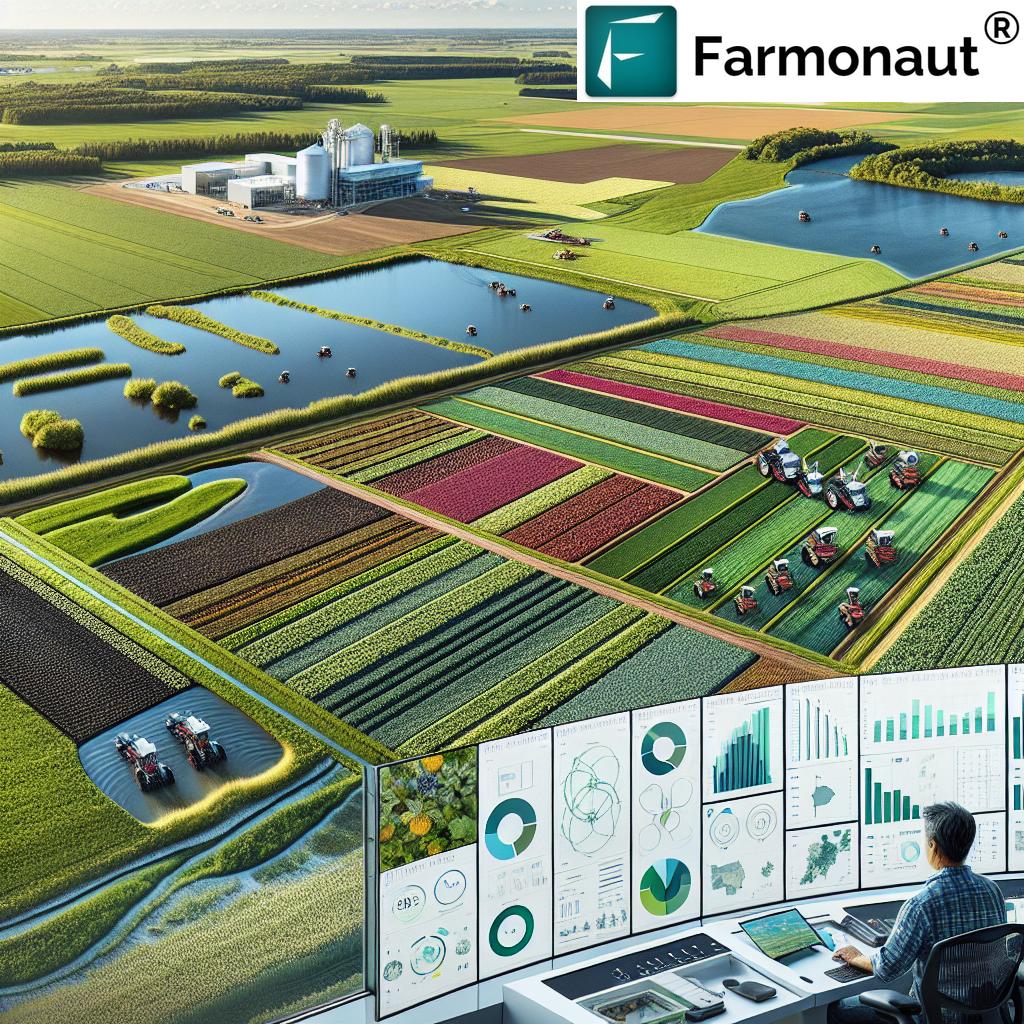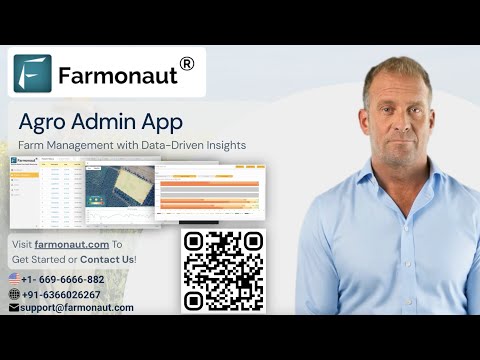Revolutionizing Minnesota Agriculture: How Farmonaut’s Precision Farming Technologies Boost Crop Yields and Soil Health

“Precision farming technologies can increase crop yields by up to 30% while reducing water usage by 20-50%.”
In the heart of America’s breadbasket, Minnesota’s agricultural landscape is undergoing a profound transformation. As we navigate the challenges of feeding a growing global population while preserving our precious natural resources, the integration of cutting-edge precision farming technologies has become not just an option, but a necessity. At the forefront of this agricultural revolution stands Farmonaut, a pioneering agritech company that’s reshaping the way we approach farming in the North Star State and beyond.
In this comprehensive exploration, we’ll delve into how Farmonaut’s innovative solutions are boosting crop yields, enhancing soil health, and paving the way for a more sustainable and productive agricultural future in Minnesota. From satellite-based crop monitoring to AI-driven advisory systems, we’ll uncover the technologies that are making precision agriculture accessible to farmers of all scales.
The Precision Agriculture Revolution in Minnesota
Minnesota’s rich agricultural heritage is entering a new era, one where data-driven decisions and technological innovation are becoming as crucial as the fertile soil beneath our feet. As stewards of the land, we recognize the need to embrace sustainable agriculture practices that not only increase productivity but also preserve our natural resources for future generations.
Farmonaut’s suite of precision farming technologies is at the heart of this transformation, offering Minnesota farmers the tools they need to optimize their operations, reduce environmental impact, and increase profitability. Let’s explore how these advanced solutions are addressing some of the most pressing challenges in modern agriculture.
Satellite-Based Crop Health Monitoring: A Bird’s-Eye View of Farm Performance
One of Farmonaut’s flagship technologies is its satellite-based crop health monitoring system. This powerful tool provides farmers with real-time insights into their fields’ performance, leveraging multispectral imagery to assess vegetation health, soil moisture levels, and other critical metrics.
- NDVI (Normalized Difference Vegetation Index): This key indicator helps farmers quickly identify areas of stress or low productivity within their fields.
- Soil Moisture Analysis: By understanding soil moisture distribution, farmers can optimize irrigation practices, reducing water waste and improving crop resilience.
- Early Problem Detection: Satellite imagery allows for the early identification of pest infestations, disease outbreaks, or nutrient deficiencies, enabling prompt intervention.
For Minnesota farmers, this technology translates to more informed decision-making, targeted resource allocation, and ultimately, higher crop yields. By identifying problem areas early, farmers can take proactive measures to address issues before they escalate, potentially saving entire harvests.
Jeevn AI: Your Personal Farm Advisor
Farmonaut’s Jeevn AI advisory system represents a significant leap forward in farm management. This AI-driven tool analyzes a wealth of data, including satellite imagery, weather forecasts, and historical farm performance, to provide personalized recommendations for crop management.
- Custom Crop Strategies: Jeevn AI tailors its advice to each farm’s unique conditions, considering factors like soil type, climate, and crop variety.
- Real-Time Weather Integration: By incorporating up-to-date weather data, the system helps farmers make timely decisions on planting, harvesting, and pest control.
- Yield Optimization: Through continuous learning and data analysis, Jeevn AI helps farmers progressively improve their yields season after season.
For Minnesota’s diverse agricultural landscape, from the corn and soybean fields of the southern plains to the wheat farms of the Red River Valley, Jeevn AI offers tailored insights that can significantly boost productivity and reduce resource waste.
Blockchain-Based Traceability: Enhancing Trust and Transparency
In an era where consumers are increasingly concerned about the origin and quality of their food, Farmonaut’s blockchain-based traceability solution offers a powerful tool for Minnesota farmers to differentiate their products and build consumer trust.
- Farm-to-Table Tracking: Every step of a product’s journey, from the field to the consumer’s plate, can be securely recorded and verified.
- Quality Assurance: Blockchain technology ensures that information about farming practices, certifications, and quality standards is tamper-proof and easily accessible.
- Market Access: Enhanced traceability can open up new market opportunities, particularly for Minnesota’s organic and specialty crop producers.
This technology not only benefits consumers but also protects farmers by providing irrefutable evidence of their sustainable and quality-focused practices, potentially commanding premium prices for their produce.
Optimizing Resource Management for Sustainable Farming
Efficient resource management is crucial for the long-term sustainability of Minnesota’s agricultural sector. Farmonaut’s technologies offer comprehensive solutions for optimizing the use of water, fertilizers, and other inputs, ensuring that farms remain productive while minimizing their environmental footprint.
Smart Irrigation Systems: Conserving Minnesota’s Water Resources
Water is a precious resource, and in Minnesota, where agriculture accounts for a significant portion of water use, smart irrigation systems are revolutionizing water management. Farmonaut’s technology integrates with these systems to provide data-driven irrigation strategies.
- Precision Water Application: By analyzing soil moisture data and crop water requirements, smart irrigation systems apply water only where and when it’s needed.
- Weather-Based Adjustments: Irrigation schedules are automatically adjusted based on weather forecasts, preventing overwatering and reducing runoff.
- Water Use Efficiency: Farmers can track their water use efficiency over time, identifying opportunities for further conservation.
These smart irrigation practices not only conserve water but also contribute to healthier crop growth and reduced energy costs associated with pumping and distribution.

Precision Fertilizer Application: Nurturing Soil Health
Overapplication of fertilizers can lead to nutrient runoff, impacting Minnesota’s water quality and soil health. Farmonaut’s precision agriculture tools enable farmers to apply fertilizers with unprecedented accuracy.
- Variable Rate Application: By mapping soil nutrient levels across fields, farmers can apply fertilizers at variable rates, ensuring each area receives exactly what it needs.
- Timing Optimization: AI-driven recommendations help farmers time their fertilizer applications for maximum uptake and minimal loss.
- Environmental Protection: Precision application reduces the risk of nutrient runoff into Minnesota’s lakes and rivers, protecting these vital ecosystems.
This targeted approach not only reduces input costs for farmers but also contributes to the long-term health and productivity of Minnesota’s agricultural soils.
“Agricultural data analytics can help farmers reduce input costs by 15% and increase overall farm profitability by 20%.”
Empowering Minnesota Farmers with Data-Driven Insights
In the digital age, data is as valuable as any other farm input. Farmonaut’s platform transforms raw data into actionable insights, empowering Minnesota farmers to make informed decisions that drive productivity and sustainability.
Agricultural Data Analytics: Turning Information into Action
Farmonaut’s advanced analytics tools process vast amounts of data from various sources, providing farmers with clear, actionable insights.
- Yield Prediction: By analyzing historical data, current crop conditions, and weather forecasts, farmers can get accurate yield predictions to inform their marketing and storage decisions.
- Pest and Disease Forecasting: Data-driven models help predict the likelihood of pest infestations or disease outbreaks, allowing for preventive measures.
- Resource Optimization: Analytics help identify inefficiencies in resource use, from water to labor, enabling farmers to streamline their operations.
For Minnesota’s diverse agricultural sector, from small family farms to large-scale operations, these analytics tools level the playing field, giving all farmers access to sophisticated decision-making capabilities.
Farm Management Software: Streamlining Operations
Farmonaut’s farm management software serves as a central hub for all farm-related data and operations, streamlining management tasks and improving overall efficiency.
- Integrated Planning: From crop rotation to resource allocation, the software helps farmers plan all aspects of their operations in one place.
- Real-Time Monitoring: Farmers can track field operations, equipment performance, and crop development in real-time, enabling quick responses to any issues.
- Financial Management: Built-in tools for budgeting, expense tracking, and profitability analysis help farmers maintain a clear picture of their financial health.
By centralizing farm management tasks, this software frees up valuable time for Minnesota farmers to focus on strategic decision-making and hands-on farm work.
Promoting Sustainable Agriculture in Minnesota
Sustainability is at the heart of Farmonaut’s mission, aligning perfectly with Minnesota’s commitment to environmental stewardship. The company’s technologies play a crucial role in promoting sustainable agriculture practices across the state.
Organic Farming Support: Enhancing Natural Practices
For Minnesota’s growing organic farming sector, Farmonaut offers specialized tools to support chemical-free production methods:
- Natural Pest Control: AI-driven systems help identify beneficial insects and optimal timing for biological pest control methods.
- Crop Rotation Planning: Advanced algorithms assist in designing optimal crop rotation schedules to maintain soil health and natural pest resistance.
- Certification Compliance: Blockchain-based traceability helps organic farmers easily demonstrate compliance with certification requirements.
These tools help organic farmers overcome some of the challenges associated with chemical-free farming, making organic production more viable and profitable in Minnesota.
Carbon Footprint Reduction: Farming for the Future
Farmonaut’s carbon footprinting tools enable Minnesota farmers to measure and reduce their environmental impact:
- Emissions Tracking: Farmers can monitor their carbon emissions from various farm activities, identifying areas for improvement.
- Sustainable Practice Recommendations: The system suggests practices that can reduce emissions while maintaining or improving productivity.
- Carbon Credit Opportunities: By accurately tracking carbon sequestration, farmers can potentially participate in carbon credit markets, creating a new revenue stream.
This focus on carbon footprint reduction not only benefits the environment but also positions Minnesota farmers as leaders in sustainable agriculture, potentially opening up premium markets for their products.
The Economic Impact of Precision Agriculture in Minnesota
The adoption of Farmonaut’s precision agriculture technologies is not just an environmental win; it’s also driving significant economic benefits for Minnesota’s agricultural sector.
Increased Profitability: Maximizing Returns on Investment
By optimizing resource use and improving crop yields, Farmonaut’s technologies directly contribute to increased farm profitability:
- Input Cost Reduction: Precise application of water, fertilizers, and pesticides can significantly reduce input costs.
- Yield Improvements: Data-driven decision-making leads to better crop management and higher yields.
- Premium Market Access: Enhanced traceability and sustainability practices can open up premium markets for Minnesota produce.
These economic benefits make precision agriculture technologies a sound investment for Minnesota farmers, with the potential for substantial returns over time.
Job Creation and Skill Development
The adoption of precision agriculture technologies is creating new job opportunities and driving skill development in Minnesota’s agricultural sector:
- Tech-Savvy Farm Workers: There’s growing demand for workers with skills in operating and maintaining precision agriculture technologies.
- Data Analysts and Agronomists: The need for professionals who can interpret agricultural data and provide expert recommendations is on the rise.
- Agritech Startups: The growth of precision agriculture is fostering a vibrant agritech startup ecosystem in Minnesota.
This evolution in the job market is helping to attract young talent to agriculture, ensuring the long-term vitality of Minnesota’s farming communities.
Overcoming Challenges in Adoption
While the benefits of precision agriculture are clear, there are challenges that Minnesota farmers may face in adopting these new technologies. Farmonaut is committed to addressing these barriers to ensure widespread access to its innovative solutions.
Education and Training: Bridging the Knowledge Gap
To help farmers make the most of its technologies, Farmonaut offers comprehensive education and training programs:
- Online Learning Resources: A wealth of tutorials, webinars, and guides are available to help farmers get up to speed with the latest technologies.
- Hands-On Training: Practical workshops and field demonstrations provide farmers with hands-on experience using Farmonaut’s tools.
- Ongoing Support: A dedicated support team is available to assist farmers with any questions or issues they encounter.
These educational initiatives are crucial in ensuring that Minnesota farmers of all ages and technological backgrounds can confidently adopt and benefit from precision agriculture technologies.
Accessibility and Affordability: Making Precision Agriculture Inclusive
Farmonaut is committed to making its technologies accessible to farms of all sizes:
- Scalable Solutions: Offerings are designed to be scalable, allowing farmers to start small and expand their use of precision agriculture tools as they grow comfortable with the technology.
- Flexible Pricing Models: Various pricing tiers and subscription options ensure that farms of different sizes and budgets can access Farmonaut’s technologies.
- Integration with Existing Equipment: Where possible, Farmonaut’s solutions are designed to work with farmers’ existing equipment, minimizing the need for large upfront investments.
By prioritizing accessibility and affordability, Farmonaut is working to ensure that all Minnesota farmers can benefit from the precision agriculture revolution, regardless of their operation’s size or resources.
The Future of Minnesota Agriculture with Farmonaut
As we look to the future, the integration of Farmonaut’s precision agriculture technologies promises to reshape Minnesota’s agricultural landscape in profound ways. Here’s a glimpse of what the future might hold:
- Autonomous Farming: Integration of Farmonaut’s AI systems with autonomous farm equipment could lead to fully automated farming operations, optimizing efficiency and reducing labor costs.
- Predictive Agriculture: Advanced AI and machine learning models could provide increasingly accurate predictions of crop yields, market trends, and environmental changes, allowing farmers to plan seasons ahead.
- Vertical Integration: Farmonaut’s traceability solutions could enable seamless integration between farms, processors, and retailers, creating more efficient and transparent food supply chains.
- Climate-Resilient Farming: As climate change presents new challenges, Farmonaut’s data-driven insights will be crucial in helping Minnesota farmers adapt their practices to changing conditions.
These advancements promise to make Minnesota agriculture more productive, sustainable, and resilient in the face of future challenges.
Conclusion: A New Era for Minnesota Agriculture
The integration of Farmonaut’s precision farming technologies marks the beginning of a new era for Minnesota agriculture. By harnessing the power of satellite imagery, AI, blockchain, and data analytics, we’re not just improving crop yields and soil health; we’re fundamentally transforming the way we approach farming.
From the corn fields of southern Minnesota to the wheat farms of the Red River Valley, these technologies are empowering farmers to make more informed decisions, optimize their resources, and produce higher-quality crops while reducing their environmental impact. The result is a more sustainable, productive, and profitable agricultural sector that’s well-positioned to meet the challenges of the 21st century.
As we continue to embrace and refine these innovative solutions, Minnesota stands at the forefront of the global agricultural revolution. With Farmonaut’s technologies leading the way, we’re not just feeding the world; we’re nurturing the land, supporting rural communities, and paving the way for a brighter, more sustainable future for generations to come.
The journey towards fully integrated precision agriculture is ongoing, but with each passing season, Minnesota’s farmers are proving that technology and tradition can work hand in hand to create a thriving, sustainable agricultural ecosystem. As we look to the future, one thing is clear: the seeds of innovation we’re planting today will yield a bountiful harvest for years to come.
Precision Farming Technologies Comparison
| Technology Name | Primary Function | Estimated Crop Yield Increase (%) | Soil Health Impact | Water Conservation Potential (%) | Implementation Complexity | Estimated ROI (%) |
|---|---|---|---|---|---|---|
| Agricultural Drones | Crop Monitoring & Spraying | 15-20 | Medium | 10-15 | Medium | 20-30 |
| Smart Irrigation Systems | Water Management | 10-15 | High | 30-50 | Medium | 25-35 |
| Soil Sensors | Soil Health Monitoring | 10-20 | High | 20-30 | Low | 15-25 |
| Crop Monitoring Satellites | Large-Scale Crop Assessment | 15-25 | Medium | 15-25 | Low | 30-40 |
| Farm Management Software | Data Integration & Analysis | 20-30 | Medium | 20-35 | Medium | 35-50 |
Frequently Asked Questions (FAQ)
- What is precision agriculture, and how does it benefit Minnesota farmers?
Precision agriculture is the use of technology to optimize crop production and resource management. It benefits Minnesota farmers by increasing crop yields, reducing input costs, and promoting sustainable farming practices. - How does Farmonaut’s satellite-based crop monitoring work?
Farmonaut uses multispectral satellite imagery to assess crop health, soil moisture, and other key metrics. This data is analyzed to provide farmers with actionable insights for improved crop management. - Can small-scale farmers in Minnesota afford Farmonaut’s technologies?
Yes, Farmonaut offers scalable solutions and flexible pricing models to make its technologies accessible to farms of all sizes, including small-scale operations. - How does Farmonaut’s technology help with water conservation in agriculture?
Farmonaut’s smart irrigation systems and soil moisture analysis help farmers apply water more efficiently, reducing waste and conserving this vital resource. - What kind of support does Farmonaut provide for farmers adopting its technologies?
Farmonaut offers comprehensive education and training programs, including online resources, hands-on workshops, and ongoing technical support. - How does Farmonaut’s blockchain technology benefit Minnesota farmers?
Blockchain technology enables transparent and secure traceability of agricultural products, helping farmers build trust with consumers and potentially access premium markets. - Can Farmonaut’s technologies help organic farmers in Minnesota?
Yes, Farmonaut offers specialized tools for organic farming, including support for natural pest control methods and crop rotation planning. - How does Farmonaut contribute to reducing agriculture’s carbon footprint?
Farmonaut’s carbon footprinting tools help farmers track and reduce their emissions, promoting more sustainable farming practices. - What is the Jeevn AI advisory system, and how does it work?
Jeevn AI is an artificial intelligence system that analyzes farm data to provide personalized recommendations for crop management, helping farmers make more informed decisions. - How can Minnesota farmers get started with Farmonaut’s precision agriculture technologies?
Farmers can visit Farmonaut’s website or contact their sales team to learn about available solutions and how to integrate them into their operations.
Access Farmonaut’s Innovative Solutions
Ready to revolutionize your farming practices with Farmonaut’s cutting-edge precision agriculture technologies? Explore our range of solutions designed to boost your crop yields, enhance soil health, and drive sustainable growth in Minnesota’s agricultural sector.
Get started with Farmonaut today:
For developers and businesses looking to integrate Farmonaut’s powerful agricultural data into their own systems, explore our API solutions:
Farmonaut API
API Developer Documentation
Choose Your Farmonaut Subscription
Join the precision agriculture revolution and transform your farming practices with Farmonaut. Together, we can build a more sustainable, productive, and prosperous future for Minnesota agriculture.






